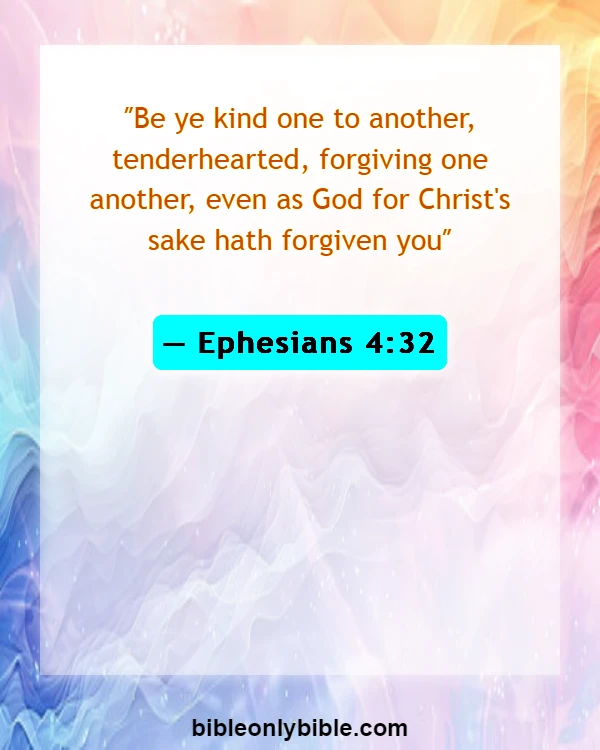Friends, if you’re searching for “Bible Verses About Holding Grudges And Forgiveness,” this content is for you. Today, I share Bible verses that can really help you better understand forgiveness and letting go of grudges according to the Bible. These scriptures offer guidance on overcoming resentment, embracing forgiveness, and cultivating a heart of compassion. Let’s explore what the Word says about releasing anger and choosing reconciliation over holding onto past hurts.
Contents
- 1 What Does the Bible Say About Holding Grudges?
- 2 Biblical Verses on the Power of Forgiveness
- 3 How to Let Go of Resentment According to Scripture
- 3.1 Ephesians 4:26-27 – Do not let anger fester; forgive quickly
- 3.2 Hebrews 12:15 – Avoid bitterness; pursue peace and grace diligently
- 3.3 1 Peter 2:1 – Rid malice, deceit, hypocrisy, envy, slander
- 3.4 Matthew 5:23-24 – Reconcile with others before offering your gift
- 3.5 Proverbs 19:11 – Wisdom brings patience; overlooking offense shows glory
- 4 Jesus’ Teachings on Forgiveness and Reconciliation
- 5 Old Testament Wisdom About Anger and Forgiveness
- 5.1 Proverbs 15:1 – Gentle words calm anger, harsh words provoke
- 5.2 Ecclesiastes 7:9 – Control anger; avoid grudges for wisdom
- 5.3 Psalm 37:8 – Refrain from anger and avoid wrath
- 5.4 Genesis 50:17 – Joseph forgives brothers, exemplifies release of grudges
- 5.5 Leviticus 19:18 – Love others, forgive, avoid holding grudges
- 6 The Spiritual Consequences of Unforgiveness
- 7 Practical Steps to Forgive Based on Biblical Principles
- 8 Bible Verses for Healing from Hurt and Betrayal
What Does the Bible Say About Holding Grudges?
Holding onto grudges can be like carrying a heavy weight that drags us down. The Bible urges us to release these burdens, not just for the sake of others, but for our own peace and freedom. By letting go, we open our hearts to healing and become more like the person God created us to be. Let’s explore some verses that guide us in this journey.
Ephesians 4:31 – Remove bitterness, wrath, anger, and malice

Let all bitterness, wrath, anger, clamour, evil speaking, be put away from you, with all malice
Ephesians 4:31
Explanation:- This verse encourages us to let go of negative emotions such as bitterness, anger, and malice. It teaches that holding onto these feelings can harm our relationships and spiritual well-being. Instead, we are called to embrace forgiveness and cultivate a spirit of kindness and compassion.
Colossians 3:13 – Forgive as the Lord forgave you

Forbearing one another, forgiving one another, if any man have a quarrel against any: even as Christ forgave you, so also do ye
Colossians 3:13
Explanation:- Colossians 3:13 encourages us to forgive others just as we have been forgiven by the Lord. Holding grudges can burden our hearts, but embracing forgiveness reflects God’s love and grace, fostering peace and reconciliation in our relationships.
Matthew 6:14 – Forgive others to be forgiven by God

For if ye forgive men their trespasses, your heavenly Father will also forgive you
Matthew 6:14
Explanation:- Forgiving others is essential for receiving God’s forgiveness. Holding grudges prevents spiritual growth and disrupts our relationship with God. Embracing forgiveness leads to healing and reflects God’s love, reminding us to let go of resentment for inner peace and divine grace.
Proverbs 10:12 – Love covers all offenses, not hatred

Hatred stirreth up strifes: but love covereth all sins
Proverbs 10:12
Explanation:- Hatred fuels conflict, but love fosters peace and healing. The verse encourages letting go of grudges and embracing forgiveness. By choosing love, we can overcome offenses and promote harmony, highlighting the transformative power of compassion over bitterness.
James 5:9 – Do not grumble; judgment is near

Grudge not one against another, brethren, lest ye be condemned: behold, the judge standeth before the door
James 5:9
Explanation:- Grumbling against others fosters bitterness and division, hindering forgiveness. The verse warns that holding grudges invites judgment, urging believers to focus on reconciliation and grace. By letting go of resentment, we align with Christ’s teachings and prepare for His return.
Biblical Verses on the Power of Forgiveness
Forgiveness is a powerful act that can transform relationships and bring us closer to God. It requires strength and courage, but the rewards are profound. When we forgive, we reflect God’s love and grace, allowing both ourselves and others to move forward. Let’s delve into some scriptures that highlight the transformative power of forgiveness.
Matthew 18:21-22 – Forgive seventy-seven times, limitless forgiveness

Then came Peter to him, said, Lord, how oft shall my brother sin against me, I forgive him? till seven times?Jesus saith unto him, I say not unto thee, Until seven times: but, Until seventy times seven
Matthew 18:21-22
Explanation:- In this passage, Jesus teaches the importance of limitless forgiveness, urging us to forgive others repeatedly, beyond just a few times. It highlights the power of forgiveness in breaking the cycle of grudges and fostering compassion and reconciliation in our relationships.
Luke 6:37 – Forgive others; release judgment to receive the same

Judge not, ye shall not be judged: condemn not, ye shall not be condemned: forgive, ye shall be forgiven
Luke 6:37
Explanation:- This verse encourages us to forgive and refrain from judging others. By extending grace and releasing grudges, we open ourselves to receive the same kindness and forgiveness from God and others, fostering a spirit of compassion and mercy in our lives.
Mark 11:25 – Forgive others to receive God’s forgiveness

When ye stand praying, forgive, if ye have ought against any: that your Father also which is in heaven may forgive you your trespasses
Mark 11:25
Explanation:- This verse highlights the importance of forgiving others to receive God’s forgiveness. Holding grudges hinders our spiritual growth and relationship with God. Embracing forgiveness not only heals us but also aligns us with God’s grace and mercy, fostering peace and reconciliation.
How to Let Go of Resentment According to Scripture
Resentment is like a poison that can seep into our hearts and minds, affecting our well-being. The Bible offers wisdom on how to release this negative emotion, encouraging us to embrace compassion and understanding. By turning to scripture, we find practical guidance on how to free ourselves from resentment and embrace a more joyful life.
Ephesians 4:26-27 – Do not let anger fester; forgive quickly

Be ye angry, sin not: let not the sun go down upon your wrathNeither give place to the devil
Ephesians 4:26-27
Explanation:- This passage advises against letting anger linger, urging us to address it quickly. By resolving conflicts before they escalate, we prevent bitterness and resentment from taking root. Embracing forgiveness not only aligns with Christian teachings but also fosters personal peace and healthy relationships.
Hebrews 12:15 – Avoid bitterness; pursue peace and grace diligently

Looking diligently lest any man fail of the grace of God; lest any root of bitterness springing up trouble you, thereby many be defiled
Hebrews 12:15
Explanation:- This scripture encourages believers to be vigilant against bitterness, which can disrupt peace and hinder God’s grace. By actively seeking reconciliation and extending forgiveness, we maintain harmony and spiritual health, aligning our lives with God’s call to love and unity.
1 Peter 2:1 – Rid malice, deceit, hypocrisy, envy, slander

Wherefore laying aside all malice, all guile, hypocrisies, envies, all evil speakings
1 Peter 2:1
Explanation:- This verse urges believers to release negative emotions and behaviors such as malice, deceit, hypocrisy, envy, and slander. By letting go of these harmful attitudes, individuals can foster forgiveness and spiritual growth, aligning themselves with a more Christ-like way of living.
Matthew 5:23-24 – Reconcile with others before offering your gift

Therefore if thou bring thy gift to the altar, there rememberest that thy brother hath ought against theeLeave there thy gift before the altar, go thy way; first be reconciled to thy brother, then come offer thy gift
Matthew 5:23-24
Explanation:- This passage teaches that reconciliation with others is essential before worshiping God. It emphasizes the importance of resolving conflicts and letting go of resentment, highlighting that forgiveness and mending relationships are crucial steps in spiritual practice and offering sincere gifts to God.
Proverbs 19:11 – Wisdom brings patience; overlooking offense shows glory

The discretion of a man deferreth his anger; it is his glory to pass over a transgression
Proverbs 19:11
Explanation:- This verse highlights the value of patience and the strength found in forgiving others. It teaches that wisdom enables us to control our anger, and choosing to overlook offenses reflects a person’s true honor and maturity, fostering peace and understanding.
Jesus’ Teachings on Forgiveness and Reconciliation
Jesus taught us the importance of forgiveness and reconciliation, showing us how to mend broken relationships and restore peace. His teachings encourage us to forgive as we have been forgiven, extending grace to others as a reflection of God’s love. Let’s explore some key teachings from Jesus on how to live a life of forgiveness and harmony.
Luke 17:3-4 – Forgive repeatedly if repentance is shown

Take heed to yourselves: If thy brother trespass against thee, rebuke him; if he repent, forgive himAnd if he trespass against thee seven times in a day, seven times in a day turn again to thee, saying, I repent; thou shalt forgive him
Luke 17:3-4
Explanation:- In these verses, Jesus teaches the importance of forgiveness and reconciliation. He emphasizes that if someone repents, we should forgive them repeatedly. This highlights the need for compassion and the willingness to restore relationships, reflecting God’s mercy and grace.
Matthew 6:12 – Forgive others as God forgives your debts

Forgive us our debts, as we forgive our debtors
Matthew 6:12
Explanation:- This verse highlights the importance of forgiving others as an essential part of spiritual life. It teaches that just as God forgives our sins, we must also let go of grudges and extend forgiveness to those who have wronged us, fostering reconciliation and peace.
John 20:23 – Authority to forgive sins granted by Jesus

Whose soever sins ye remit, they are remitted unto them; whose soever sins ye retain, they are retained
John 20:23
Explanation:- In this verse, Jesus empowers His disciples with the authority to forgive sins, emphasizing the importance of forgiveness in the Christian community. It underscores the transformative power of reconciliation, highlighting that forgiveness is a divine mandate and a central aspect of spiritual leadership.
Old Testament Wisdom About Anger and Forgiveness
The Old Testament is rich with wisdom on managing anger and the power of forgiveness. These ancient texts provide timeless insights into the human experience, guiding us to let go of anger and embrace forgiveness for a more harmonious life. Let’s discover the enduring lessons from these scriptures that continue to resonate today.
Proverbs 15:1 – Gentle words calm anger, harsh words provoke

A soft answer turneth away wrath: but grievous words stir up anger
Proverbs 15:1
Explanation:- Gentle words have the power to soothe and defuse anger, fostering an environment where forgiveness can flourish. In contrast, harsh words can escalate tensions and deepen grudges. This wisdom encourages us to choose our words carefully, promoting peace and reconciliation.
Ecclesiastes 7:9 – Control anger; avoid grudges for wisdom

Be not hasty in thy spirit to be angry: for anger resteth in the bosom of fools
Ecclesiastes 7:9
Explanation:- This verse emphasizes the importance of controlling anger and avoiding grudges. It teaches that holding onto anger is unwise and detrimental to one’s spirit. Embracing forgiveness and letting go of resentment leads to true wisdom and inner peace.
Psalm 37:8 – Refrain from anger and avoid wrath

Cease from anger, forsake wrath: fret not thyself in any wise to do evil
Psalm 37:8
Explanation:- This verse advises letting go of anger and avoiding wrath, highlighting the wisdom of maintaining peace and forgiveness. Holding onto anger can lead to negative consequences, whereas releasing it fosters healing and aligns with a forgiving spirit, promoting harmony and personal well-being.
Genesis 50:17 – Joseph forgives brothers, exemplifies release of grudges

So shall ye say unto Joseph, Forgive, I pray thee now, the trespass of thy brethren, their sin; for they did unto thee evil: now, we pray thee, forgive the trespass of the servants of the God of thy father. Joseph wept when they spake unto him
Genesis 50:17
Explanation:- In Genesis 50:17, Joseph demonstrates profound forgiveness by releasing the deep-seated grudge against his brothers who wronged him. This act serves as a powerful example of letting go of anger and embracing reconciliation, embodying the wisdom of forgiveness found in the Old Testament.
Leviticus 19:18 – Love others, forgive, avoid holding grudges

Thou shalt not avenge, nor bear any grudge against the children of thy people, but thou shalt love thy neighbour as thyself: I am the Lord
Leviticus 19:18
Explanation:- This verse teaches that love and forgiveness are essential virtues. It urges us to release anger and avoid holding grudges. By loving our neighbors as ourselves, we foster compassion and understanding, aligning with the wisdom of the Old Testament on managing emotions and promoting peace.
The Spiritual Consequences of Unforgiveness
Choosing not to forgive can have profound spiritual consequences, affecting our relationship with God and others. Unforgiveness can create barriers that keep us from experiencing the fullness of God’s love and grace. By understanding these consequences, we can be motivated to seek forgiveness and embrace a life of spiritual freedom.
Matthew 6:15 – Forgive others to receive God’s forgiveness

But if ye forgive not men their trespasses, neither will your Father forgive your trespasses
Matthew 6:15
Explanation:- Harboring grudges can block divine forgiveness. When we forgive others, we open our hearts to receive God’s grace and mercy. Unforgiveness hinders our spiritual growth and relationship with God, emphasizing the importance of letting go and embracing compassion.
Ephesians 4:32 – Be kind, forgive as God forgave you

Be ye kind one to another, tenderhearted, forgiving one another, even as God for Christ’s sake hath forgiven you
Ephesians 4:32
Explanation:- This verse encourages kindness and forgiveness, reminding us to emulate God’s forgiveness towards us. Holding grudges can harm our spiritual well-being, while forgiving others fosters healing and reflects divine love, promoting peace and reconciliation in our relationships.
James 2:13 – Mercy triumphs over judgment, forgive to be forgiven

For he shall have judgment without mercy, that hath shewed no mercy; mercy rejoiceth against judgment
James 2:13
Explanation:- This verse highlights the importance of mercy over judgment, reminding us that holding grudges can lead to spiritual consequences. Forgiveness is essential, as showing mercy to others invites mercy upon ourselves, emphasizing the transformative power of compassion and understanding in our spiritual lives.
Practical Steps to Forgive Based on Biblical Principles
Forgiving someone isn’t always easy, but the Bible offers practical steps to help us on this journey. By following these principles, we can learn to forgive authentically, finding peace and freedom in the process. Let’s explore how scripture guides us in taking these steps towards forgiveness, leading to a more fulfilling life.
Matthew 18:15 – Address faults privately to seek reconciliation

Moreover if thy brother shall trespass against thee, go tell him his fault between thee him alone: if he shall hear thee, thou hast gained thy brother
Matthew 18:15
Explanation:- This verse encourages addressing conflicts directly and privately, fostering reconciliation and understanding. By confronting issues with love and humility, we create an environment for healing and forgiveness, helping to release grudges and strengthen relationships in accordance with biblical teachings.
Romans 12:17-21 – Overcome evil with good, live peacefully, and forgive
Recompense to no man evil for evil. Provide things honest in the sight of all menIf it be possible, as much as lieth in you, live peaceably with all menDearly beloved, avenge not yourselves, but rather give place unto wrath: for it is written, Vengeance is mine; I will repay, saith the LordTherefore if thine enemy hunger, feed him; if he thirst, give him drink: for in so doing thou shalt heap coals of fire on his headBe not overcome of evil, but overcome evil with good
Romans 12:17-21
Explanation:- This passage encourages overcoming evil with good by choosing forgiveness over vengeance. It urges living peacefully with others, leaving justice to God, and responding to wrongs with kindness. By doing so, we break the cycle of hostility and embody Christ-like love and compassion.
Luke 17:3 – Rebuke, forgive if they repent

Take heed to yourselves: If thy brother trespass against thee, rebuke him; if he repent, forgive him
Luke 17:3
Explanation:- This verse encourages believers to address wrongs directly by rebuking those who sin against them. If the wrongdoer repents, forgiveness should be granted. This approach aligns with biblical principles of reconciliation and emphasizes the importance of both accountability and grace in relationships.
Bible Verses for Healing from Hurt and Betrayal
Healing from hurt and betrayal is a journey that the Bible supports with comforting and encouraging words. These verses remind us that we are never alone in our pain and that God is always ready to heal our wounds. By turning to scripture, we can find the strength and hope needed to overcome these challenges and find peace.
Psalm 147:3 – God heals wounds and restores the brokenhearted

He healeth the broken in heart, bindeth up their wounds
Psalm 147:3
Explanation:- This verse reminds us that God is compassionate and powerful, offering healing to those who have been hurt or betrayed. It assures us that divine comfort can mend emotional wounds and restore the brokenhearted, encouraging us to let go of grudges and embrace forgiveness.
Isaiah 41:10 – God’s presence offers strength and support

Fear thou not; for I am with thee: be not dismayed; for I am thy God: I will strengthen thee; yea, I will help thee; yea, I will uphold thee with the right hand of my righteousness
Isaiah 41:10
Explanation:- This verse assures us of God’s constant presence, offering strength and support during times of hurt and betrayal. It encourages us to release grudges and embrace forgiveness, trusting in His power to heal and uplift us through life’s challenges.
2 Corinthians 1:3-4 – God comforts us to comfort others

Blessed be God, even the Father of our Lord Jesus Christ, the Father of mercies, the God of all comfortWho comforteth us in all our tribulation, that we may be able to comfort them which are in any trouble, by the comfort wherewith we ourselves are comforted of God
2 Corinthians 1:3-4
Explanation:- This passage highlights God’s compassion and comfort during our struggles. When we experience His healing, we’re empowered to extend the same comfort to others facing hurt and betrayal. It encourages us to transform personal pain into a source of healing for others.
Romans 8:28 – All things work together for good through God

We know that all things work together for good to them that love God, to them who are the called according to his purpose
Romans 8:28
Explanation:- This verse reassures us that God can transform our pain and betrayal into something positive. Even when we face hurt, trusting in God’s plan allows us to find healing and forgiveness, knowing that every experience contributes to our ultimate good and spiritual growth.
Psalm 34:18 – God is near to the brokenhearted

The Lord is nigh unto them that are of a broken heart; saveth such as be of a contrite spirit
Psalm 34:18
Explanation:- This verse reassures us that God’s presence is close to those who are hurting or have been betrayed. It emphasizes His compassion and readiness to heal our wounds, encouraging us to release grudges and embrace forgiveness as part of our healing journey.
